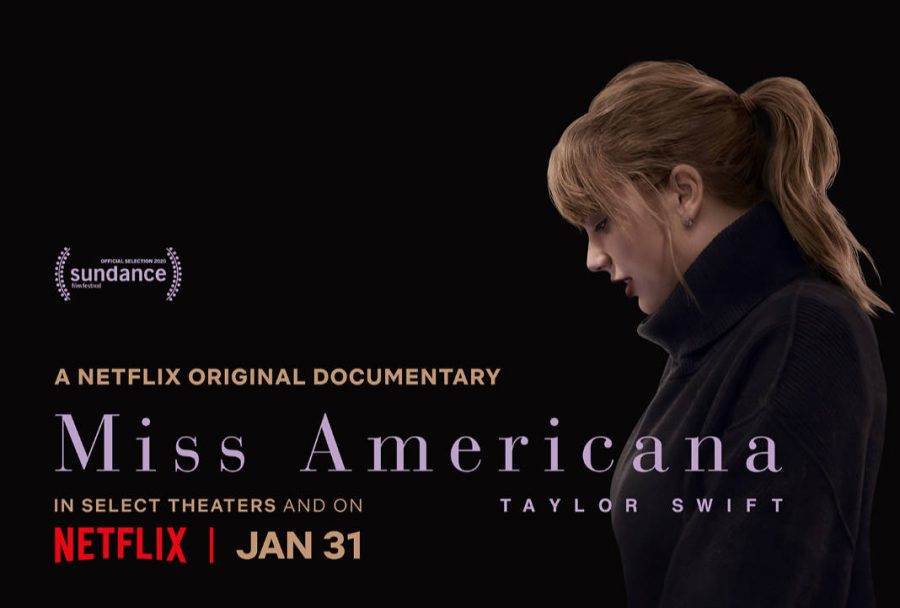Over the past decade, Taylor Swift has risen to a level of fame that makes it nearly impossible to picture her doing anything besides performing in gigantic stadiums or walking red carpets. “Miss Americana,” directed by Lana Wilson, is a recent Netflix documentary, first released on Jan. 23. Wilson dismantles the mystique that surrounds Swift and offers a raw glimpse at a side of her that’s never been publically accessible.
“Miss Americana” is not just a linear narrative of Swift’s rise to the top, but an exploration of how a woman who has spent half of her life under intense public scrutiny functions. As footage of her second Album of the Year win at the Grammys rolls, Swift quietly asks, “Shouldn’t I have someone to call right now?” While watching the film, it’s easy to forget that Swift is primarily known for catchy break up anthems and live shows covered in confetti and glitter, as throughout the film her life is shown to be profoundly lonely and strange. She jokes about stalkers breaking into her house, and when asked why she does her own nails quips, “I really can’t go in public” as if it’s the most normal thing in the world.
Swift’s honesty throughout the film is almost jarring, as she typically avoids commenting on her personal life and supposed drama. Her long conversations with the camera are minimally edited and the moments where Swift stumbles over her words or pauses awkwardly are often the most revealing. In a particularly emotional scene, she explains her long-standing struggle with body image and disordered eating, then glances away from the camera to admit, “I did exercise a lot, but I wasn’t eating.” This is a pivotal moment, not just within the documentary, but within the context of Swift’s entire career, as it’s the first time she’s touched on any personal obstacles so candidly. From this scene on it becomes clear that “Miss Americana” is Swift’s attempt at a new kind of honesty, one that’s not hidden in song lyrics, but one that has a chance to shine light on broader issues.
Swift’s openness extends into the second half of the film, which focuses heavily on politics and her 2017 sexual assault trial. The bulk of Swift’s political comments are captured in a heated argument with her team and her parents. All of Swift’s public conversations about politics up to this point have felt measured and deliberate, so seeing her on the brink of tears as she explains why she’s so passionate about certain policies feels refreshing. Swift also lets her emotions show through in a brief summary of her sexual assault trial, culminating in a powerful statement on the pitfalls of how the court handles such cases and the dehumanization of victims throughout the process.
It’s that kind of raw emotion that makes “Miss Americana” so unique among Swift’s countless interviews and public statements. She doesn’t shy away from anything, putting the segments detailing the media’s rampant criticism of her in a different light. Seeing Swift panic while telling her mom that “It’s more than music now,” after watching footage of a crowd at a Kanye West concert chanting “f— Taylor Swift,” which at first might seem insignificant and even ridiculous, feels almost sickening now. At every turn the audience is reminded of Swift’s humanity, a concept that is often hard to grasp alongside her larger than life image, and as a result it becomes almost impossible to avoid sympathizing with her. “Miss Americana” exposes an endearing side of Swift, exemplified by her cat-carrier backpack and admittance that she didn’t try a burrito until she was 26, that serves to push back at the media’s often villainized portrayal of her.
Swift’s final statement, that celebrities are “frozen at the age they got famous and that’s kinda what happened to me,” touches on a sense of immaturity that’s hinted at throughout the documentary. Swift is shown to be somewhat of a paradox; she’s wise beyond what’s to be expected for a 30 year old, yet still possesses the uncertainty of a teenager. More than just a chronicle of Swift’s career accomplishments or an intimate look at the last few years of her life, “Miss Americana” is an exposé of the ugly side of fame.
Molly Hamilton can be reached at [email protected].




















